. Install the New Window with Expanders, Shims, and Screws
|
|
 |
|
|
|
|
|
|
|
|
|
|
|
|
|
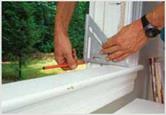
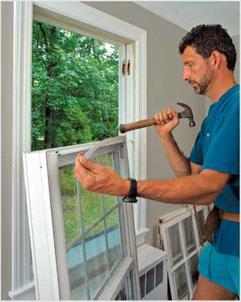
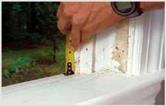
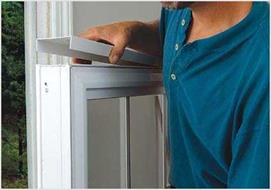

homeowners, but many local fabricators have a retail store on site that will sell you windows at a small premium over wholesale prices.
You can also buy replacement windows at a home center. If your house is 50 years old or less, you can find fairly good-quality
windows in standard sizes to fit the existing openings.
I advise shopping around, but be sure you’re comparing equal products and services. Some companies’ standard features are options that cost more from other fabricators. Frame thickness and extrusion designs
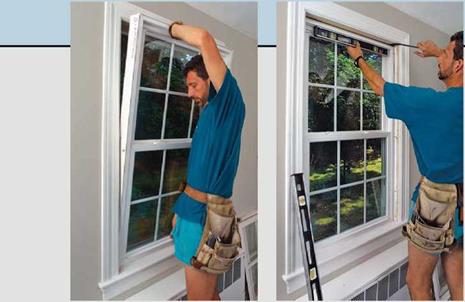
3. Insert and center the window. Drive two mounting screws partway through the window frame and into the jambs to keep the window in place. Then use a small pry bar to get the frame centered, level, and plumb.
|
|
4. 

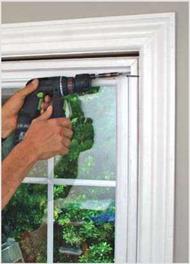
Secure the window. Insert shims between the window and the jamb as backing for mounting screws. drive mounting screws in all the pilot holes. sometimes these holes are concealed by sash stops or balance guards that can be slid out of the way or removed.
can differ. Bargain windows might have lower-quality frames that require more time to shim and brace adequately for proper operation.
If I have a choice, I use high-quality vinyl windows made locally. Although they might not be a popular name brand, the warranty
is good (20 years) and the price is reasonable. Also, if problems arise, there’s someone local to call.
Get Maximum Value with a Good Weatherseal
 |
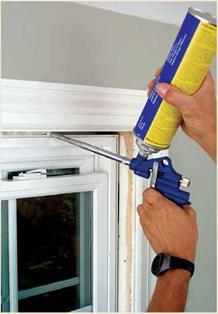 |
If I’ve spent the money, time, and effort to replace a window, I want to get the best performance I possibly can. Proper weathersealing calls for spray foam and caulk.
Foam the gaps. Use low-expanding foam to fill gaps between the old jamb and the new window.
Accurate Measurements Are Critical
I always take measurements myself, and if the sales rep comes out to help, I check that person’s work. The last thing I want is to show up on the morning of a whole-house window replacement and find out that someone else messed up the order.
Most important is checking top, bottom, middle, and diagonally for square. The new window has to be sized for the shortest measurement (see the drawing on p. 112).
I use a systematic approach with my own order sheet to note dimensions and location.
Writing measurements on a block of wood just doesn’t cut it. One wrong measurement, and you own a perfectly good window that doesn’t fit.
Know How the Windows Are Sized
Replacement-window fabricators make units on a VWn. basis, a 1/2-in. basis, or a combination of the two. This guideline forces you to order a unit smaller than anticipated when a dimension falls on a 1/8-in. increment, but undersizing a window is better than having it too tight. Window height is more forgiving than width due to the sill and head
|
1 |
Choose the Right Window |
|
|
any manufacturers that make windows for new construction also make replacement windows. In addition to the factors listed below, you’ll need to consider cost and |
||
|
warranty details. |
||
|
Style |
Wood |
|
|
Double-hung, single-hung, casement, awning, |
• Requires painting |
|
|
and other window styles are available. |
• Compatible with historic houses |
|
|
Glass |
Fiberglass |
|
|
The choices include different types of insu- |
• Stronger than vinyl and just as durable |
|
|
lated glass, such as glass with heat-reflective |
• Available with wood interior surfaces |
|
|
coatings and gas-filled glass. You can also |
• Low maintenance |
|
|
order windows with snap-in grilles or true |
• Usually more expensive than other types |
|
|
divided lites. |
Aluminum-clad |
|
|
Material |
• Durable exterior, wood interior |
|
|
The type of material used in the window deter- |
• Many colors available |
|
|
mines its price, its durability, and its appear- |
• Aluminum can be painted |
|
|
ance. Here’s a quick tour: |
Vinyl-clad |
|
|
Vinyl |
• Durable exterior |
|
|
• Usually less expensive than other types |
• Wood or finished interior |
|
|
• Durable, low maintenance • Limited color choice |
• Limited color choice |
|
expanders, which is why many fabricators offer V4-in. width sizing and only V2-in. height sizing. If I have to choose between leaving only V8 in. of wiggle room or having s/8 in. to play with, I’ll take the bigger measurement. Some window fabricators take orders based on opening measurements, and they make the deductions to actual unit size from information you supply. I never order this way because it does not account for out-ofsquare conditions. Make your own deductions from the measured opening, and order the actual window size (sometimes called tip-to-tip size). |
|
Guarantee a Smooth, Safe Installation Wherever I start, I move the furniture out of the way for clear access to the window, and I cover the floor with a drop cloth to collect paint chips and debris. I always use a vacuum and a dust brush to clean out the windowsill and to clean up the floor when I’m done working. |
Mike Guertin (www. mikeguertin. com) is a builder, remodeling contractor, and writer in East Greenwich, R. I.






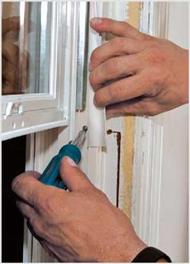
Leave a reply